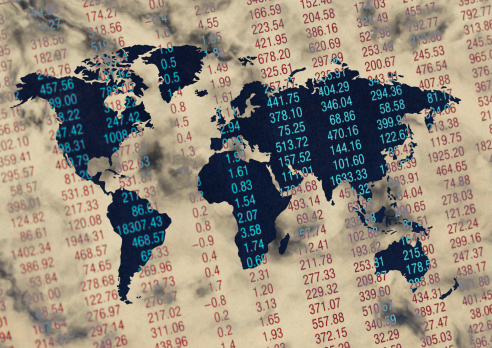As the world’s rich and powerful gather at Davos, the International Monetary Fund (IMF) had a message for them and other world leaders. The agency followed the World Bank’s decision to downgrade the world’s grow rate.
And the IMF did take the timing of Davos to pass along the forecast, its follow-up to the October 2014 World Economic Outlook:
Global growth is forecast to rise moderately in 2015–16, from 3.3 percent in 2014 to 3.5 percent in 2015 and 3.7 percent in 2016, revised down by 0.3 percent for both years relative to the October 2014 World Economic Outlook (WEO).
As with the World Bank assessment, the United States was among the only bright spots:
For 2015, the U.S. economic growth has been revised up to 3.6 percent, largely due to more robust private domestic demand. Cheaper oil is boosting real incomes and consumer sentiment, and there is continued support from accommodative monetary policy, despite the projected gradual rise in interest rates. In contrast, weaker investment prospects weigh on the euro area growth outlook, which has been revised down to 1.2 percent, despite the support from lower oil prices, further monetary policy easing, a more neutral fiscal policy stance, and the recent euro depreciation. In Japan, where the economy fell into technical recession in the third quarter of 2014, growth has been revised down to 0.6 percent. Policy responses, together with the oil price boost and yen depreciation, are expected to strengthen growth in 2015–16.
ALSO READ: Americans Are Feeling Better About Their Financial Situation
The problems in Japan and the euro area are simply continuations of troubles since the Great Recession, although there was a brief period when the forecasts for Europe improved.
As China announced 2014 GDP growth of 7.4% for 2014, the IMF became more pessimistic about its prospects:
First, the growth forecast for China, where investment growth has slowed and is expected to moderate further, has been marked down to below 7 percent. The authorities are now expected to put greater weight on reducing vulnerabilities from recent rapid credit and investment growth and hence the forecast assumes less of a policy response to the underlying moderation. This lower growth, however, is affecting the rest of Asia.
China exists in a strange situation where 7% GDP growth of the world’s second largest nation economically is a disappointment. However just a year ago it and other large emerging nations were supposed to be the engines of global economic expansion.
Also, the news about Russia was as should be expected:
Second, Russia’s economic outlook is much weaker, with growth forecast downgraded to –3.0 percent for 2015, as a result of the economic impact of sharply lower oil prices and increased geopolitical tensions.
Sanctions and oil prices continue to take their toll.
For the time being, the “growth engine” position has been passed back to the United States.
ALSO READ: Top 1% to Have Half the World’s Wealth Next Year
It’s Your Money, Your Future—Own It (sponsor)
Retirement can be daunting, but it doesn’t need to be.
Imagine having an expert in your corner to help you with your financial goals. Someone to help you determine if you’re ahead, behind, or right on track. With SmartAsset, that’s not just a dream—it’s reality. This free tool connects you with pre-screened financial advisors who work in your best interests. It’s quick, it’s easy, so take the leap today and start planning smarter!
Don’t waste another minute; get started right here and help your retirement dreams become a retirement reality.
Thank you for reading! Have some feedback for us?
Contact the 24/7 Wall St. editorial team.


